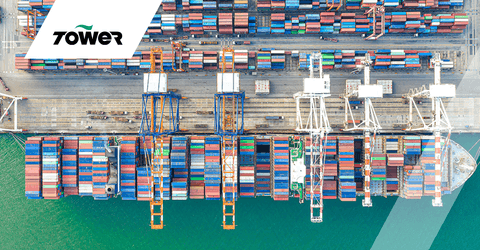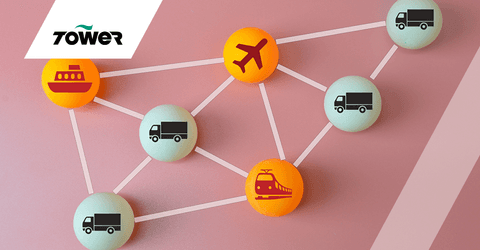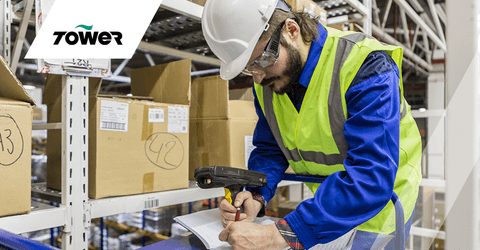
There’s no doubt that ‘sustainably’ is the hottest topic in town.
It’s the buzzword that companies throughout the world are using to readjust their values, reconfigure their mission, and even completely change the way they do business.
But for us in supply chain, it’s not a new concept.
It’s part of our DNA as a supplier.
Why? Because a GOOD supply chain is a SUSTAINABLE supply chain. And as the person that leads the management of the supply chain here at Tower, I see waste as the NATURAL ENEMY of sustainability.
When I look back at the supply chain improvements I’ve seen in the last 15 years, we have always been moving in a sustainable direction. Because everyone wants less waste and to use less resources.
Does that mean the hard work is over?
Not a chance.
Our mission right now is to a) work with partners and manufacturers to prioritise sustainability in the chain and b) work with customers to help them make sustainable choices.
But there are challenges.
With the complexity of the supply chain and the many partnerships that have developed over the years, there is a real mix of how far companies have (or have not) come in terms of sustainability.
Even if some people would like to tear up the floor and start again, it isn’t possible. The supply chain is made up of decades-long partnerships and entrenched systems that cannot be changed overnight.
We see it as our responsibility to educate who we work with and support people with expert advice on how they can make their influence on the supply chain sustainable and environmentally friendly.
If we are not willing to make our own sacrifices and take our own risks to get where we all want to go, how can we expect our partners and customers to do the same?
Reducing how much workwear and PPE a company buys might seem counter-intuitive for a supplier. But if it means less going into landfill, then we will encourage them to rationalise and consolidate.
The challenge when it comes to sustainability is the trust you need to have and nurture in your partners. Build that trust, and you will help guide each other along the way.

It’s no good making everyone follow a set of rules if they don’t work for everyone. That’s why we are constantly creating flexible solutions that benefit lots of different customers.
Reviewing and reducing cost-in-use, offering fully sustainable workwear made from recycled materials, and portals that help them manage their orders are just a few examples.
We look at how much material is being used in manufacturing and where there is too much stock being ordered. We also routinely review and reduce the miles taken up in supply chain logistics.
Some of it is learned through research, education, and practice. And some of it takes resource. But it all needs to be done with the right approach from the start.
It’s not just about getting the products in for the customer. That’s just one part of it. It’s also about balancing that procurement with the costs and the efficiencies that the company needs.
We are always reviewing the supply chain in its entirety. And as a good supply chain manager, you are making sure to consolidate the product ranges whilst finding the best partners to work with.
Price is important, but you also need to look carefully at service, communication, and ethics. This is especially significant if you want to work with them closely on sustainability.
We look for partners that are already open to, or on, the sustainable journey. Even if they are not quite ready to make every sustainable change possible, they are at least ready to be shown the way.
But we choose partners because they are good at what they do, such as how well they manufacture clothing or innovate PPE and safety equipment.

We need to support our partners on their sustainable journey in ways that will not affect how well they perform within the supply chain. We need to be innovative about how we can help them.
We can look at who is doing the designing, the testing, the quality checks, and sourcing the raw materials. All these things can be looked at to improve sustainability throughout the chain.
If our partner is prepared to work with us on sustainability, then everyone benefits. As I said earlier, waste is our natural enemy, so we want to be more efficient, less wasteful, and more sustainable.
For example, a ‘just-in-time’ supply chain was understood to be a supply chain ‘ideal’. But the pandemic has shown it may not be the most sustainable way to move and store materials.
This makes sharing the experiences and practices along the supply chain crucial for us to ensure we learn as we go and move in the right direction with partners and customers alike.
Here at Tower, we have put a big focus on helping customers with their end-of-life plans for their workwear and uniforms.
This type of clothing is disproportionally sent to landfill. This is because workwear and uniform, especially when branded, cannot be sent to charity or sold on eBay due to security concerns.
We offer our workwear textile destruction and recycling service. This takes old clothes and PPE away to be recycled securely and safely without damaging the environment.
I love that sustainability and its goals have always been part of Tower’s DNA.
Working with partners to help us all work towards sustainability is part of our business model. We want customers to get the maximum life out of products, to improve the value of what we offer.